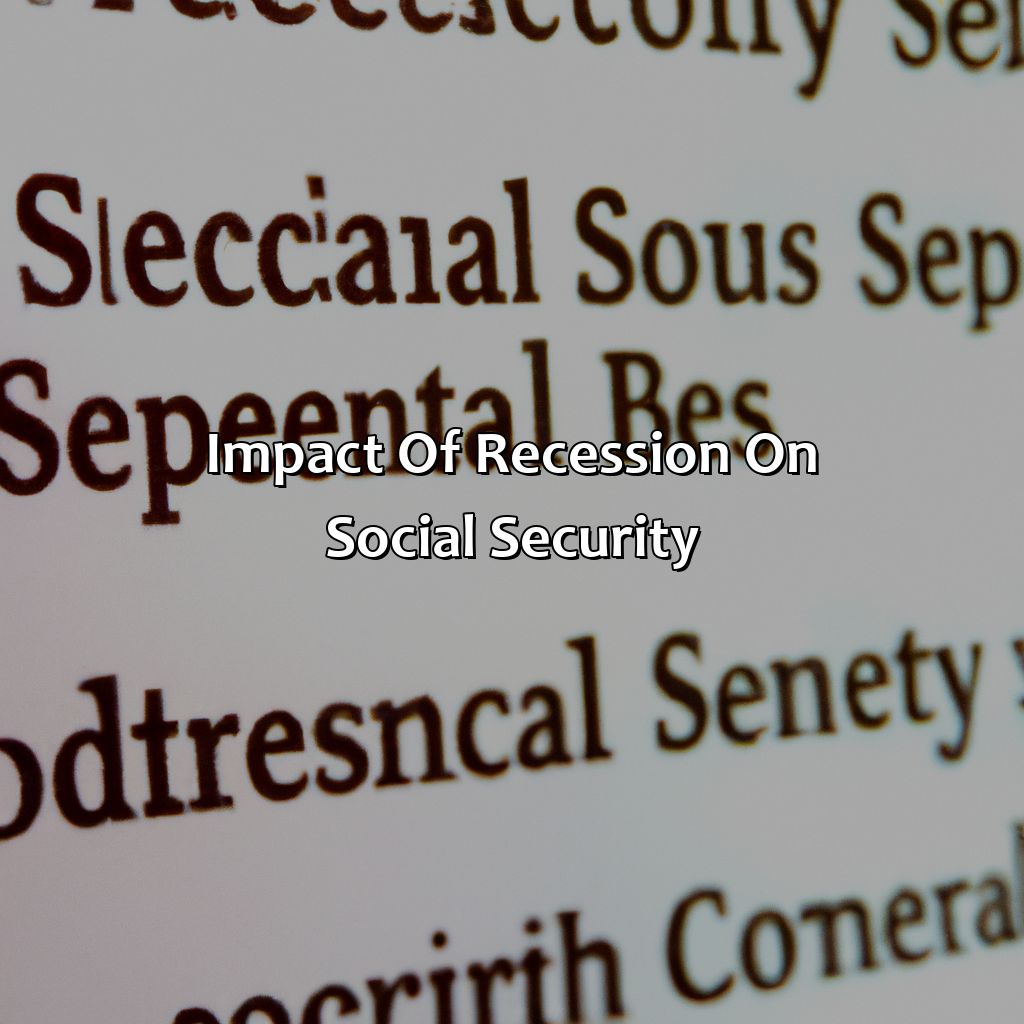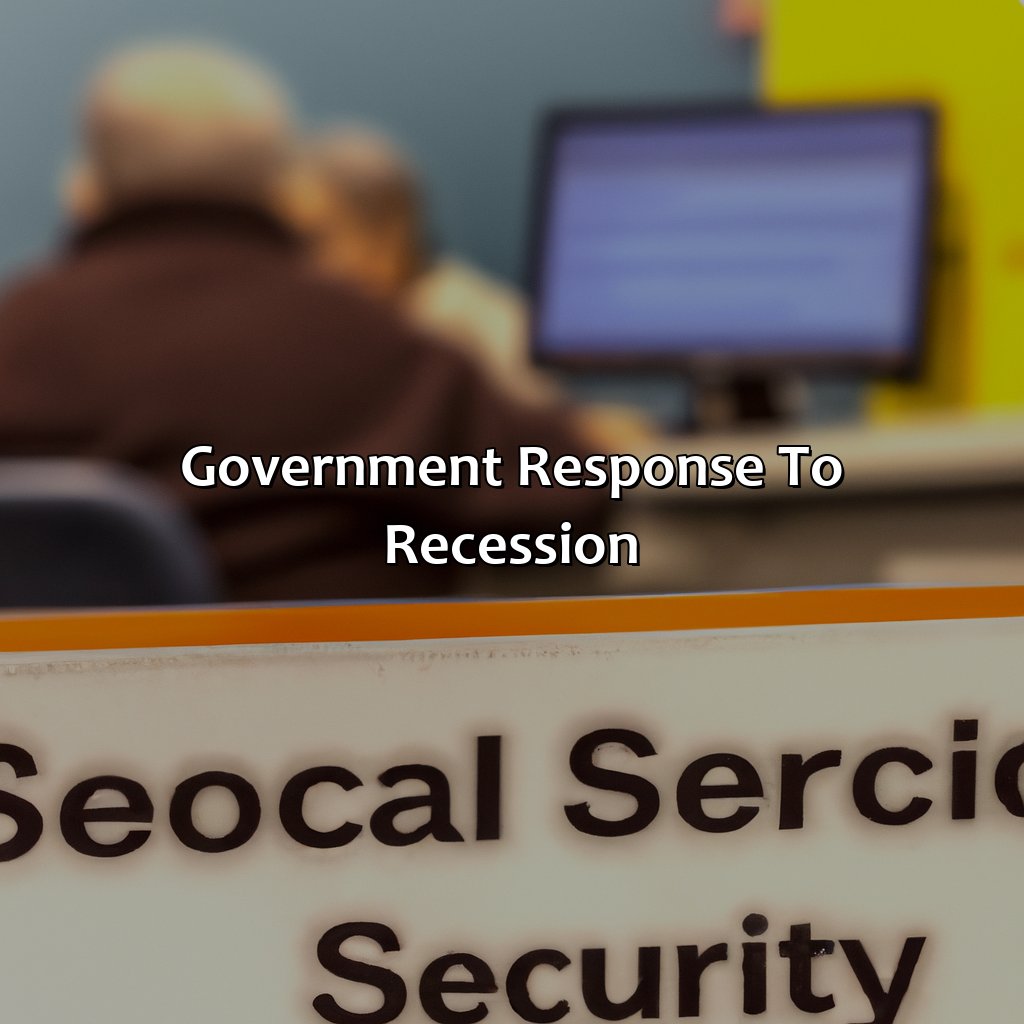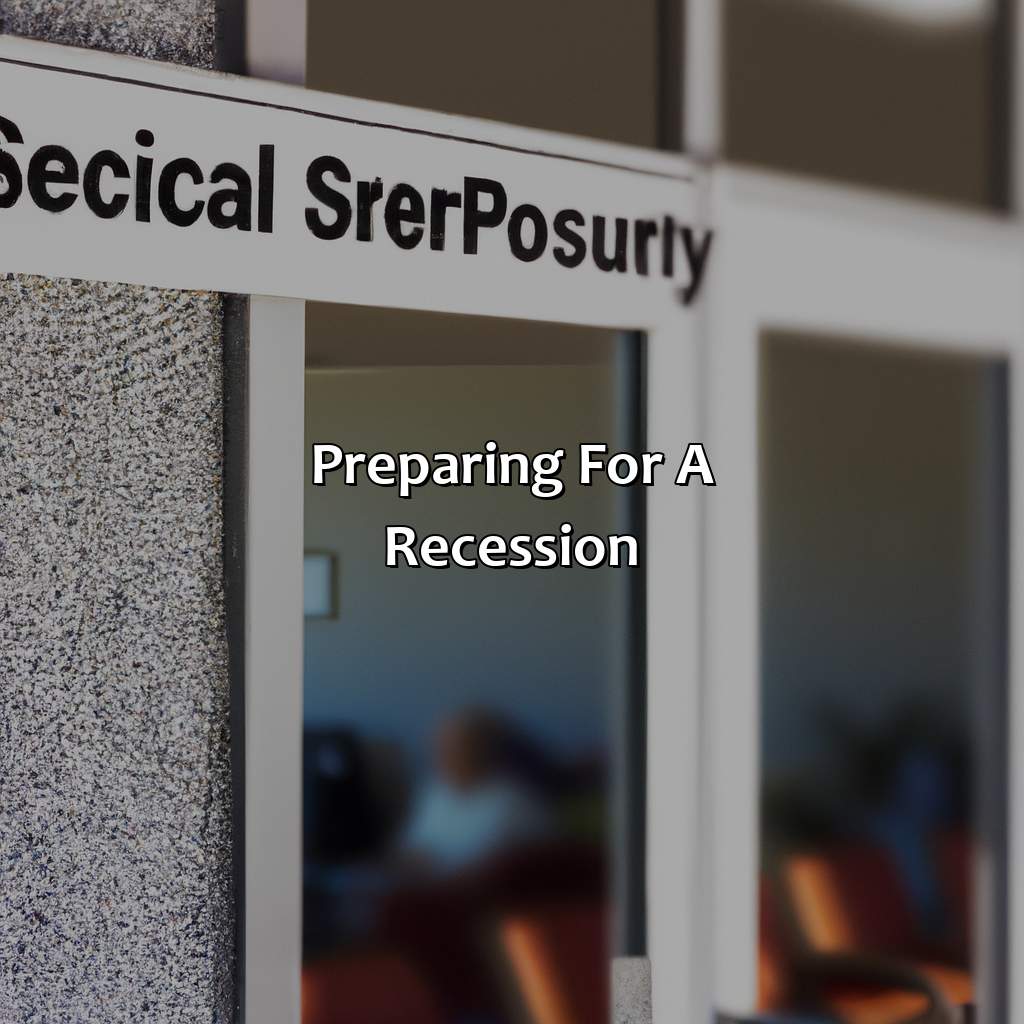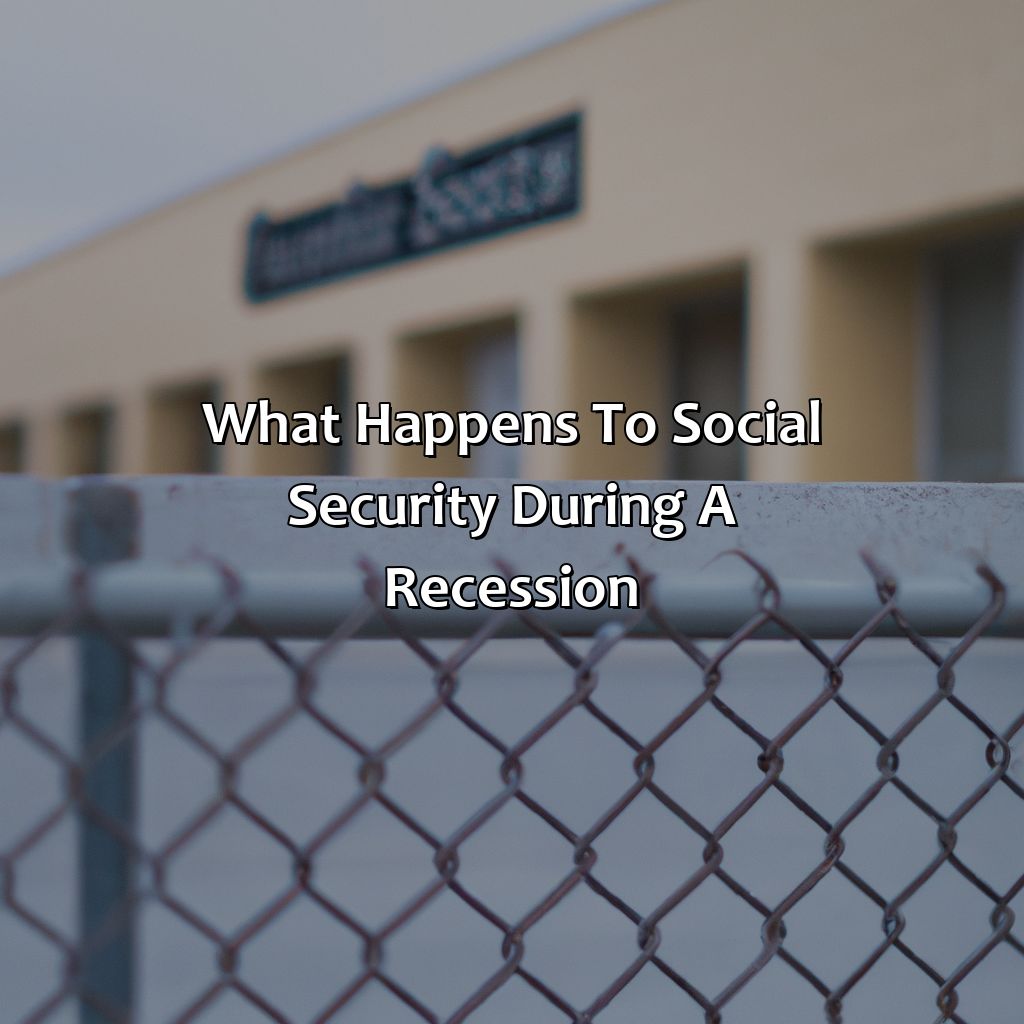What Happens To Social Security During A Recession?
Key Takeaway:
- During a recession, there may be a reduction in contributions to the Social Security system. A decrease in the number of workers and their earnings can lead to smaller contributions to the system, which can impact future benefits.
- In a downturn, there could be a decrease in Social Security benefits. The Social Security system is designed to provide for those in retirement, and a recession can result in reduced benefits due to funding shortfalls.
- The impact of a recession on Social Security funding can be severe, leading to funding shortfalls. The government may need to take measures such as policy changes and stimulus packages to address these funding gaps.
As you worry about a recession’s effect on your retirement savings, you may wonder what will happen to Social Security. In this blog post, we’ll explain how your Social Security benefits and eligibility could be impacted by a recession.
Impact of Recession on Social Security
To grasp the effects of a recession on Social Security and its users, explore the section called ‘Impact of Recession on Social Security.’ This section includes subsections such as:
- Reduction in Contributions
- Decrease in Benefits
- Funding Shortfalls
These subsections offer potential solutions for these negative impacts.

Image credits: retiregenz.com by Yuval Duncun
Reduction in Contributions
During an economic recession, there is a reduction in the number of people who are actively contributing to Social Security. This decrease in contributions often results in a significant strain on the overall financial health of the Social Security system. The fewer people who are actively contributing can cause a sudden shortfall in funding and may result in decreased benefits for those relying on this support.
As a result of reduced contributions, the Social Security Trust Fund may begin to deplete more rapidly than expected. While solutions such as raising payroll taxes or cutting benefits could help to address this issue, these options may not be politically or socially desirable. To mitigate these effects, it is essential to have strong financial planning, including consistent contributions and programs that help bridge short-term gaps.
To ensure that Social Security remains sustainable during difficult economic times, policymakers must prioritize good stewardship practices that balance social welfare with fiscal responsibility. A coordinated effort between government agencies and private corporations can also help maintain healthy contribution levels through initiatives like employee training and education programs that promote retirement savings plans and other forms of long-term financial planning. By acting proactively, we can help minimize any adverse economic impact on the vital social safety net provided by our nation’s Social Security system.
Looks like the only thing decreasing faster than social security benefits during a recession is my will to live.
Decrease in Benefits
The Impact of Economic Downturns on Social Security can lead to a reduction in the benefits provided by the system. This can happen due to various reasons such as a decrease in revenue, budget cuts or increased demand for services. Here are some ways in which this reduction in benefits can occur:
- Reduction in Cost-of-Living Adjustments (COLA)
- Increase in retirement age
- Decrease in disability benefits
- Lowering spousal and survivor benefits
- Income limitations on benefits eligibility
It is important to note that Social Security remains an indispensable safety net for millions of Americans during times of recession. However, it may require reform measures like improving stakeholder’s investments and making adjustments to taxation policies.
According to the Center on Budget and Policy Priorities, during the 2008 recession, many people who had lost their jobs applied for Social Security Disability Insurance (SSDI). The number of SSDI recipients grew from 7.1 million in 2007 to nearly 9 million by December 2012.
Research suggests that economic recessions not only affect workers’ earnings but also play a role in reducing future social security retirement benefits. During an economic downturn, individuals tend to earn less over their lifetime which, affects the highest-earning years assessed during their working life – directly influenced by social security retirement benefits calculations.
It is essential for policymakers to assess better strategies that can keep Social Security sustainable during hard times and ensure that all Americans continue receiving promised benefits regardless of varying external circumstances.
Looks like the only thing social security can count on during a recession is a shortage of funding and a surplus of bad news.
Funding Shortfalls
During an economic downturn, social security programs can face financing insufficiencies due to reduced tax revenues and increased demand for benefits. The funding inadequacies can lead to possible programmatic reductions or changes in eligibility criteria as the Social Security Trust Fund’s reserves may end up being depleted.
Such consequences will impact not only current but also future retirees’ ability to receive social security payments. Moreover, the budgetary shortfalls could potentially trigger a rise in payroll taxes and/or a decrease in benefits.
It is imperative to note that while social security programs are protected from market losses, they remain susceptible to broader economic conditions such as recessions, global pandemics, and other natural disasters that can adversely affect government revenues.
Pro Tip: It is always recommended that individuals save for retirement beyond relying solely on social security benefits. A mix of personal savings, investments, and strategic debt management can help provide financial stability during times of economic downturns.
The government’s response to the recession: printing money like it’s Monopoly and praying for a Chance card.
Government Response to Recession
To comprehend the govt’s answer to recession, dive into:
- Policy modifications
- Stimulus bundles
These two subsections illume the solutions taken by the government to battle recession.

Image credits: retiregenz.com by Adam Woodhock
Policy Changes
During a recession, the government implements modifications to policies. These adjustments are aimed at reducing the negative impact of the economic downturn on society. As a result, social security undergoes inevitable changes. In such times, it becomes even more crucial for governments to protect the wellbeing of its citizens.
To ensure that social security is not adversely affected by a recession, governments increase unemployment benefits and food stamps provisions. Also, they allocate additional funds for general healthcare and Medicaid expenses. Moreover, governments offer temporary income tax credits or rebates, providing relief to low-income earners.
The government may also decrease Social Security taxes during an economic crisis to mitigate the financial burden on employees and employers alike. Government officials may initiate regulatory changes in social welfare policies during recessions as well. For instance, relaxing rules for qualifying for assistance programs or setting up additional emergency aid programs for vulnerable groups.
It is important to note that these policy changes differ from country to country and depend on various factors such as budgetary constraints or political ideologies. Hence, it is advisable to stay informed about local policies and how they affect individuals during a recession.
Pro Tip: During a recession, keeping abreast of policy changes may enable one to take advantage of available resources and minimize negative impacts.
Looks like the government’s approach to stimulating the economy is similar to my approach to studying for exams – cram everything in at the last minute and hope for the best.
Stimulus Packages
In response to economic downturns, the government implements measures known as Economic Relief Programs. These initiatives seek to provide direct support to citizens and businesses, such as tax rebates, unemployment benefits, loans and grants, among others. Their primary objective is to boost aggregate demand in an economy experiencing a recession and increase consumer confidence in spending. The programs may also include infrastructure development and investment in public works projects that can create job opportunities for people during turbulent times.
It is worth noting that stimulus packages are not new phenomena; they have been used in the past by different governments globally. However, their effectiveness has been a matter of debate among policymakers and economists alike. Some argue they can be detrimental in the long run if not executed appropriately while others believe they can help cushion the negative effects of a recession.
As illustrated above, stimulus packages provide crucial support during challenging economic times. However, it is essential to ensure that these measures are well-targeted. This way, they can achieve their ultimate goal of improving economic conditions while minimizing negative side effects.
Pro Tip: Governments should evaluate the effectiveness of past stimulus packages before investing heavily in new ones to avoid creating adverse effects on an already fragile economy.
Stocking up on ramen noodles now, so that when the recession hits, you can pretend it’s a lifestyle choice.
Preparing for a Recession
To get ready for a recession with an emphasis on social security, you should:
- Spread out your income sources.
- Also, stash more for retirement.
- Stay up-to-date about social security changes.
These three components will give you tips on how to handle social security in challenging economic times.

Image credits: retiregenz.com by David Jones
Diversifying Income Sources
It is crucial to broaden the scope of generating income during a difficult economic situation. This improves financial security and mitigates losses that come with relying solely on employment income.
Investing in diverse ventures such as stocks, bonds, or mutual funds helps generate passive income, supplementing the primary earnings. A side-hustle or freelancing can also provide additional revenue streams.
While diversifying the sources of income, it is pertinent to gauge the risk appetite and ensure that investments are chosen wisely after due diligence. A diversified portfolio can help mitigate market volatility risks.
Social Security provides vital support to retirees, disabled persons and beneficiaries in times of need but may not offer sufficient protection. Diversifying one’s Income sources can create a cushion for sustained lifestyle even during a downturn.
According to the Social Security Administration report in 2020, Only 36% of beneficiaries rely entirely on Social Security for their Income needs.
Retirement: the time when you stop working and start living off your savings, unless of course there’s a recession and your savings become the new ramen noodles.
Saving More for Retirement
When preparing for retirement, it is essential to save more money in anticipation of unforeseen events. The financial market can be highly volatile, which could affect your savings and investments. Thus, regularly reviewing your portfolio, diversifying your assets, and setting clear goals could help you prepare for the future.
It is also crucial to make informed decisions when considering investment options. Work with a professional to balance risk and reward based on your financial goals and timeline. Consider contributing to an employer-sponsored retirement plan or opening an individual retirement account (IRA).
In today’s economy, saving more for retirement is even more critical due to the possibility of a recession. Many people rely on social security benefits as their primary source of income when retiring. In the event of a recession, social security benefits may decrease or become unstable. Therefore, saving additional funds for unforeseen events should be part of your overall retirement plan.
Throughout history, we have witnessed economic downturns that have negatively impacted people’s retirements. The Great Recession from 2007-2009 caused significant losses in investments resulting in many people delaying their retirements. By being proactive about saving more money and making informed investment choices, you can provide yourself with greater financial stability during challenging times in the future.
Staying Informed about Social Security Updates.
Staying Abreast of Social Security Updates
Keeping apprised of the latest information regarding social security is critical for ensuring financial stability during uncertain times, such as economic recessions. To stay up-to-date with the most recent developments, it’s necessary to engage in ongoing research, consult trusted sources, and maintain open communication with relevant officials.
Be sure to take advantage of the wealth of resources available online, including official government websites and independent organizations that specialize in social security issues. Subscribing to newsletters or other electronic updates can also help you keep informed about changes to social security programs.
Furthermore, monitoring legislative news and staying informed about current events can provide valuable insight into potential shifts in policy or regulation that may impact social security outcomes. By staying engaged with these developments, you can more effectively prepare for any future shifts.
Pro Tip: Consider consulting a financial advisor or retirement planner for personalized guidance on how to best navigate potential changes to social security policies.
Five Facts About Social Security During a Recession:
- ✅ Social Security benefits are not directly affected by a recession. (Source: AARP)
- ✅ However, a recession can indirectly impact Social Security funding by reducing the amount of money going into the system through payroll taxes. (Source: Center on Budget and Policy Priorities)
- ✅ The Social Security trust fund is projected to run out by 2035, but a recession could speed up this depletion. (Source: Forbes)
- ✅ During a recession, more people may be forced to claim Social Security benefits early, resulting in a reduction in their monthly payments. (Source: CNBC)
- ✅ Congress may take steps to address Social Security funding during a recession, such as increasing payroll taxes or cutting benefits. (Source: The Balance)
FAQs about What Happens To Social Security During A Recession?
What happens to Social Security during a recession?
During a recession, the Social Security Trust Fund may be impacted as fewer people are working and paying into the fund. However, the benefits to current Social Security recipients typically remain stable and unchanged.
Is Social Security safe during a recession?
Social Security is considered a stable source of income for retirees, and its benefits are generally safe during a recession. The federal government has systems in place to ensure that Social Security benefits are paid out even during times of economic hardship.
Can Social Security benefits be reduced during a recession?
Social Security benefits are not directly tied to the economy or stock market, so they are generally not reduced during a recession. However, cost-of-living adjustments may be affected by inflation rates, which can be influenced by economic conditions.
How does unemployment affect Social Security?
Unemployment can indirectly impact Social Security by reducing the number of people who are contributing to the fund through payroll taxes. This can put a strain on the Trust Fund, but it does not typically result in a reduction of benefits for current Social Security recipients.
Can Social Security be used as a form of economic stimulus during a recession?
Social Security benefits are intended to provide financial stability for retired and disabled workers, and are not typically used as a form of economic stimulus during a recession. However, some economic stimulus programs may indirectly benefit Social Security recipients by improving overall economic conditions.
What can be done to protect Social Security during a recession?
One way to protect Social Security during a recession is to ensure that the program continues to be adequately funded through payroll taxes and other revenue sources. Additionally, policymakers can implement economic stimulus programs and other measures to help mitigate the impact of the recession on Social Security recipients.


